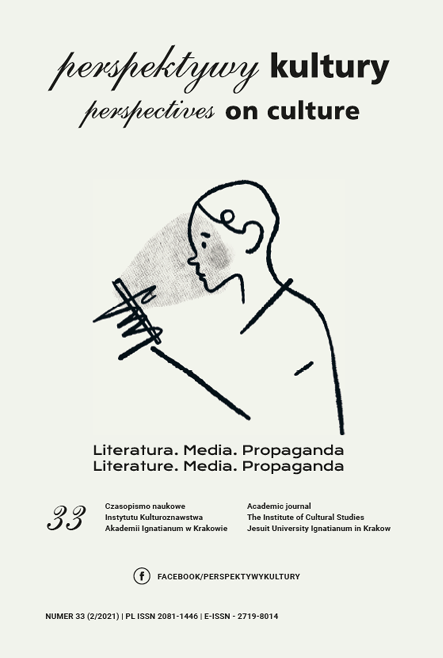Myślenie krytyczne jako podstawowa kompetencja dla liderów XXI wieku
Abstrakt
Myślenie krytyczne stanowi niezbędną kompetencję w procesach poznawczych, podejmowaniu decyzji i działaniach menedżerów. Jego znaczenie szybko rośnie, zaś relatywnie łatwy dostęp do informacji o różnej jakości i znaczeniu pod względem ich ewentualnych implikacji może prowadzić do paraliżu decyzyjnego, dysonansu poznawczego lub skutkować większą podatnością na manipulację. Artykuł omawia istotne aspekty myślenia krytycznego oraz możliwości rozwijania i doskonalenia myślenia krytycznego w przygotowaniu studentów do bycia dobrymi liderami w przyszłości.
Bibliografia
Ambrozová, E., Knap‑Stefaniuk, A., & Ullrich, D. (2017). Kritické myšlení manažerů a leadrů z pohledu možností rozvoje a vzdělávání. Praha: Scientia et Societas: Newton Books.
Ambrozová, E., Koleňák, J., Ullrich, D., & Pokorný, V. (2016). Kognitivní management. Brno: Key Publishing.
Ambrozová, E., Ullrich, D., Koleňák, J., & Pokorný, V. (2020). Vzdělávání dospělých v kontextu požadavků prostředí 4.0. In: Vzdělávání dospělých 2019 – v kontextu profesního rozvoje a sociálního kapitálu. Praha: Česká andragogická společnost.
Cejpek, J. (2005). Informace, komunikace a myšlení: úvod do informační vědy. Praha: Karolinum.
Cialdini, R.B. (2012). Vliv: síla přesvědčování a manipulace. Brno: BizBooks.
Csíkszentmihályi, M. (2015). Flow: o štěstí a smyslu života. Praha: Portál.
Csíkszentmihályi, M. (2017). Flow a práce. Přeložil Eva Hauserová. Praha: Portál.
Durand, G. (2012). Věda o člověku a tradice. Praha: Malvern.
Facione, P.A. (2011). Critical Thinking: What It Is and Why It Counts. Retrieved from: https://www.insightassessment.com/Resources/Importance‑of-Critical-Thinking/Critical-Thinking-What-It-Is-and-Why-It-Counts/ Critical-Thinking-What-It-Is-and-Why-It-Counts-PDF
Goleman, D. (2014). Pozornost: skrytá cesta k dokonalosti. Brno: Jan Melvil.
Grabowska, S. (2018). E‑learning jako pożądana forma kształcenia w dobie Industry 4.0. Scientific Papers of Silesian University of Technology. Organization & Management/ Zeszyty Naukowe Politechniki Slaskiej. Seria Organizacji i Zarzadzanie, 118, 171–180.
Hammond, K. (2000). Judgments Under Stress. New York: Oxford University Press Inc.
Hecklau, F. et al. (2017). Human Resources Management: Meta‑Study – Analysis of Future Competences in Industry 4.0, Proceedings of the International Conference on Intellectual Capital, Knowledge Management & Organizational Learning, 163–174.
Kahneman, D. (2012). Myšlení rychlé a pomalé. Brno: Jan Melvil Publishing
Knap‑Stefaniuk, A. (2020). The Role of Leadership in Managing Multicultural Teams. Polish Managers’ Point of View: Preliminary Research. Studia Paedagogica Ignatiana, Vol. 23, No. 3, 43–60.
Knap‑Stefaniuk, A. & Karna, W.J. (2016). The challenges of modern leadership. Warszawa: Wyższa Szkoła Finansów i Zarządzania.
Knap‑Stefaniuk, A. & Karna, W.J. (2018). The Role of Leadership in Contemporary Organizations as a Challenge in the 21st Century. Scientia et Societas, No. 2, 123–130.
Kostroň, L. (1997). Psychologie vytváření úsudků. Brno: Masarykova univerzita.
Koukolík, F. (2013). Já: o mozku, vědomía sebeuvědomování. Praha: Karolinum.
Lu, Y. (2017). Industry 4.0: A survey on technologies, applications and open research issues. Journal of Industrial Information Integration [online]. 6, 1. DOI: 10.1016/j.jii.2017.04.005.
Ludwig, P. (2013). Konec prokrastinace: [jak přestat odkládat a začít žít naplno]. Brno: Jan Melvil.
Mindell, Amy. (2009). Metadovednosti: spirituální umění terapie. Olomouc: ANAG.
Nazare‑Aga, I. (2012). Nenechte sebou manipulovat. Praha: Portál.
Paul, R. & Elder, L. (2006). Critical Thinking: Concepts and Tolls. Retrieved from: http://isites.harvard.edu/fs/docs/icb.topic265890.files/Critical_ Thinking_File/06_CT_Extended_Definition.pdf
Paulovčáková, L. (2018). Vzdělávání a rozvoj manažerů v kontextu manažerských kompetencí. Proceedings of the 7th International Adult Education Conference. Praha: ČAS, 49–60.
Plamínek, J. (2010). Vzdělávání dospělých: průvodce pro lektory, účastníky a zadava‑tele. Praha: Grada.
Prisecaru, P. (2017). The Challenges of the Industry 4.0. Global Economic Observer, 5(1).
Scriven, M. & Paul, R. (2003). Defining Critical Thinking [online]. Retrieved from: http://www.criticalthinking.org/pages/defining-critical-thinking/410
Seyithan, D. (2015). The relationship between critical thinking abilities and classroom management skills of high school teachers. Educational Research and Reviews [online]. 10/7.
Spitzer, M. (2014). Digitální demence. Brno: Host.
Taleb, N. (2014). Antifragilita: jak těžit z nahodilosti, neurčitosti a chaosu. Praha: Paseka.
Tavris, C. & Aronson, E. (2012). Chyby se staly (ale ne mou vinou): proč omlouváme svoje hloupé názory, chybná rozhodnutí a špatné skutky. Praha: Dokořán.
Tureckiová, M. (2018). Přístupy k rozvoji klíčových pracovníků vzdělávacích organizací. Proceedings of the 7th International Adult Education Conference, 289–296. Praha: ČAS.
Ullrich, D. et al. (2018). Competencies for Leading People in the Security Environment. In: Innovation Management and Education Excellence through Vision 2020. Milan, Italy: IBIMA.
Ullrich, D., Ambrozová, E., Pokorný, V., & Koleňák, J. (2019). Možná úskalí při vzdělávání dospělých pro prostředí, společnost a průmysl 4.0. Proceedings of the 8th International Adut Education Conference. Praha: Čas.
Ullrich, D., Koleňák, J., Ambrozová, E., Pokorný, V., & Milichovský, F. (2019). Global X-tream Index and its Partial Parameters for Identifying the Level of Potential Individual Characteristics in the Challenging Conditions of a Modern Corporate and Security Environment. Sustainability, 11(12), 1–15.
Veber, J. (2018). Digitalizace ekonomiky a společnosti: výhody, rizika, příležitosti. Praha: Management Press.
Veteška, J. (2019). Paradigma „Vzdělávání 4.0“ v éře digitalizace a globalizace. Adult Education 2018 – transformation in the era of digitization and artificial intelligence: proceedings of the 8th International Adult Education Conference. Praha: Česká andragogická společnost.
Copyright (c) 2021 Akademia Ignatianum w Krakowie

Utwór dostępny jest na licencji Creative Commons Uznanie autorstwa – Bez utworów zależnych 4.0 Międzynarodowe.
Autor, zgłaszając swój artykuł, wyraża zgodę na korzystanie przez Wydawnictwo Uniwersystet Ignatianum z utworu na następujących polach eksploatacji:
- utrwalania utworu w formie papierowej, a także na nośniku cyfrowym lub magnetycznym;
- zwielokrotnienia utworu dowolną techniką, bez ograniczenia ilości wydań i liczby egzemplarzy;
- rozpowszechniania utworu i jego zwielokrotnionych egzemplarzy na jakimkolwiek nośniku, w tym wprowadzenia do obrotu, sprzedaży, użyczenia, najmu;
- wprowadzenia utworu do pamięci komputera;
- rozpowszechniania utworu w sieciach informatycznych, w tym w sieci Internet;
- publicznego wykonania, wystawienia, wyświetlenia, odtworzenia oraz nadawania i reemitowania, a także publicznego udostępniania utworu w taki sposób, aby każdy mógł mieć do niego dostęp w miejscu i czasie przez siebie wybranym.
Wydawca zobowiązuje się szanować osobiste prawa autorskie do utworu.





